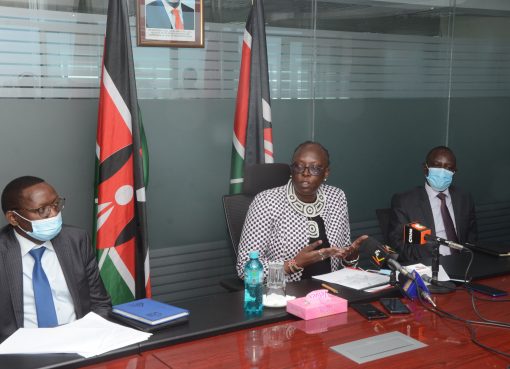The Government has reaffirmed its commitment in the fight against graft.
It has also pledged to intensify its anti-corruption efforts by strengthening oversight mechanisms, enhancing transparency in procurement processes and holding to account individuals implicated in corrupt practices.
Nakuru County Commissioner Mr Loyford Kibaara said the war against the vice is not negotiable.
He warned public servants against corruption, saying that cases of misconduct and graft will be dealt with firmly, expeditiously and with finality.
“We are committed to holding perpetrators of corruption accountable and ensuring that stolen resources are recovered and returned to the people of Kenya,” affirmed the administrator.
Speaking at a Nakuru hotel when he officially inaugurated a training of heads of department themed ‘Institutionalizing and Sustaining Ethics and Integrity in the Public Service’ Mr Kibaara said that corruption, wastage, inefficiency, and negligence are serious threats to the country’s transformation agenda and unacceptable practices that derail any meaningful development agenda.
He reiterated President William Ruto’s call on corruption, stating that the vice will not be tolerated in any ranks across the Government.
The event that was organised by the Ethics and Anti-Corruption Commission (EACC)also served as a forum to unveil the Nakuru Corruption Prevention Committee (CPC) that will be chaired by the County Commissioner with all departmental heads as members.
Mr Kibaara said that all public officials will be held personally responsible for any breach of the legal and policy provisions governing the exercise of their respective powers in the use of public resources.
“You are responsible for transforming user needs into realities. You assess products, services and suppliers and negotiate contracts to meet the planned needs of your agencies,” said the administrator.
He added: “You are obligated to always act according to the laws, policies and processes applicable, and make procurement decisions ensuring that approved purchases are of a sufficient quality and are cost-efficient.”
He said that procurement professionals play an important role in the corruption space, both positively and negatively through acts of omission and commission.
He noted that Procurement professionals, and specifically, the Heads of procurement units can make or break the corruption stranglehold, by standing on the right side of history.
Mr Kibaara said that public procurement is perceived to be more susceptible to corruption when compared to other areas of government, such as tax collection, passport issuance, the judiciary or public utilities.
“As we get to the bottom of corruption and hope to uproot it, we must have the courage and will to admit that we have often lost it due to lack of morals and ethics,” he added.
He lauded EACC for recovering property worth over Sh7 billion in Nakuru County alone.
The property was allegedly grabbed by individuals through companies and proxies.
He warned all government officials involved in corruption malpractices that the government was watching and it would take decisive action against any of them found culpable.
Mr Kibaara advised those occupying government land illegally and holding titles to surrender them to the government instead of wasting time on lengthy and costly court processes which they would in turn lose.
He reiterated the government’s position to institutionalize the fight against corruption adding that every public officer takes part in the fight against vice saying there is no option, but to win the corruption war.
The administrator advised Kenyans not to give bribes while seeking services in public offices and instead report to authorities public servants who extort bribes from them through bribery, intimidation and deliberate delay of delivering services.
EACC South Rift Regional Manager Mr Ignatius Wekesa said the Commission had embarked on rolling out Corruption Prevention Committees (CPC) across all the 47 counties in a move aimed at tackling corruption head-on.
Mr Wekesa indicated that the initiative aims to instill a culture of transparency, accountability, and integrity within government institutions.
According to the official, the Corruption Prevention Committees will be tasked with identifying and mitigating corruption risks within their respective departments.
They will work closely with relevant stakeholders to implement anti-corruption measures and ensure compliance with ethical standards and legal regulations.
“The establishment of Corruption Prevention Committees marks a significant step in our commitment to root out corruption from our government,” stated Mr Wekesa.
He added “Corruption undermines the trust of our citizens and hampers our development efforts. We must all work together to eradicate this scourge and uphold the principles of good governance.”
Wekesa said the CPC initiative targets to strengthen systems, practices and processes at the devolved units.
The official who presided over the presentation of the CPC guidelines to the County Commissioner said EACC was banking on the committees to prevent corruption and enhance transparency in county government operations.
The guidelines, he added, provide a systematic approach to public entities and private sector institutions by standardizing the establishment, operation, composition, roles and responsibilities of the CPC.
The CPCs, he said, are mandated to develop, implement, review and monitor corruption prevention framework, corruption prevention policy, whistle blowing protection mechanism, gifts and conflict of interest registers, codes of conduct and ethics and reporting mechanisms.
The committee, he added, will also prepare annual corruption prevention plans, coordinate bribery and corruption risk assessments at the same time manage and handle complaints on alleged corruption and unethical conduct.
Mr Wekesa said a training manual for the CPC has also been prepared to provide a standardized approach to the training on corruption prevention.
“The training of CPC is designed to build institutional capacity in corruption prevention, impart knowledge on ethics, integrity and anti-corruption for attitude change, and mainstream corruption prevention,” he added.
EACC, he said, was also partnering with county governments to build their capacity in the promotion of ethics, integrity and good governance adding that the CPC programme shall be scaled up to cover all the counties.
He said both County and National Governments are required to develop systems which ensure officers who handle procurement are beyond reproach and that the processes are above board.
Several watchdog reports have identified procurement as the main avenue for corruption in both tiers of the government, in the face of inflated costs, supplier horse-trading and kickbacks.
Mr Wekesa said in Nakuru the commission is pursuing other grabbed public property in court.
He said the targeted land constitutes agricultural land, road reserves, land reserved for expansion of state agencies and government houses for civil servants.
The official said according to the National Ethics and Corruption Survey released by EACC earlier this year Kenyans paid more bribes in 2023 than previous years.
Mr Wekesa stated that the survey established that the national average bribe increased from Sh6,865 in 2022 to Sh11,625 in 2023.
It also shows that at least 35.8 percent of Kenyans pay a bribe in order to acquire passport services.
This is compared to 22.1 per cent seeking employment opportunities, 11.5 percent who pay bribes to get a Police abstract and 10.3 percent who pay to bail arrested individuals.
According to the survey, you will likely be asked to pay a bribe to access services in Busia County, compared to other counties. Baringo, Nairobi, Nakuru, and Machakos counties also topped the list as the most bribery-prone counties.
Kenyans also reported that Traffic police, County Health Department and Regular Police are the three most bribery-prone public institutions in the country.
You are also more likely to pay for a bribe while seeking business registration, a Teachers Service Commission (TSC) number, relief food, obtaining a tender and vehicle transfer services.
By Anne Mwale




